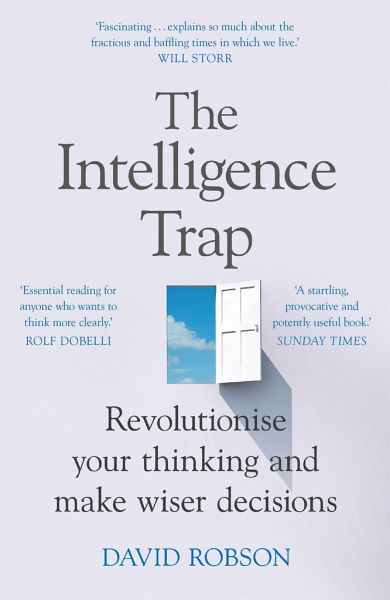
The Intelligence Trap
Revolutionise your Thinking and Make Wiser Decisions
Versandkostenfrei!
vor Weihnachten nicht mehr lieferbar
17,99 €
inkl. MwSt.
Weitere Ausgaben:

PAYBACK Punkte
9 °P sammeln!
'Essential reading for anyone who wants to think more clearly' ROLF DOBELLI'Ceaselessly fascinating and brilliantly written' WILL STORR'A startling, provocative and potently useful book' SUNDAY TIMESA toolkit to help smart people overcome their blind spots and maximise their potential, from the author of The Expectation Effect.__________We assume that smarter people are less prone to error. But education and expertise can sometimes make our mistakes worse and our blind spots bigger. Why did genius Steve Jobs make errors of judgement? Why do doctors misdiagnose 10-15% of their patients? Why do ...
'Essential reading for anyone who wants to think more clearly' ROLF DOBELLI
'Ceaselessly fascinating and brilliantly written' WILL STORR
'A startling, provocative and potently useful book' SUNDAY TIMES
A toolkit to help smart people overcome their blind spots and maximise their potential, from the author of The Expectation Effect.
__________
We assume that smarter people are less prone to error. But education and expertise can sometimes make our mistakes worse and our blind spots bigger. Why did genius Steve Jobs make errors of judgement? Why do doctors misdiagnose 10-15% of their patients? Why do Nobel Prize winners spread fake news? This is the intelligence trap.
Drawing on the latest behavioural science and great brains from Socrates to Benjamin Franklin, David Robson demonstrates how to apply our intelligence more wisely. He shows us how we can identify bias, read and regulate our emotions, fine-tune our intuition, navigate ambiguity and uncertainty and think more flexibly.
Whether you are a NASA scientist or a school student, The Intelligence Trap offers a new toolkit to realise your full potential.
'Ceaselessly fascinating and brilliantly written' WILL STORR
'A startling, provocative and potently useful book' SUNDAY TIMES
A toolkit to help smart people overcome their blind spots and maximise their potential, from the author of The Expectation Effect.
__________
We assume that smarter people are less prone to error. But education and expertise can sometimes make our mistakes worse and our blind spots bigger. Why did genius Steve Jobs make errors of judgement? Why do doctors misdiagnose 10-15% of their patients? Why do Nobel Prize winners spread fake news? This is the intelligence trap.
Drawing on the latest behavioural science and great brains from Socrates to Benjamin Franklin, David Robson demonstrates how to apply our intelligence more wisely. He shows us how we can identify bias, read and regulate our emotions, fine-tune our intuition, navigate ambiguity and uncertainty and think more flexibly.
Whether you are a NASA scientist or a school student, The Intelligence Trap offers a new toolkit to realise your full potential.
Dieser Artikel kann nur an eine deutsche Lieferadresse ausgeliefert werden.



